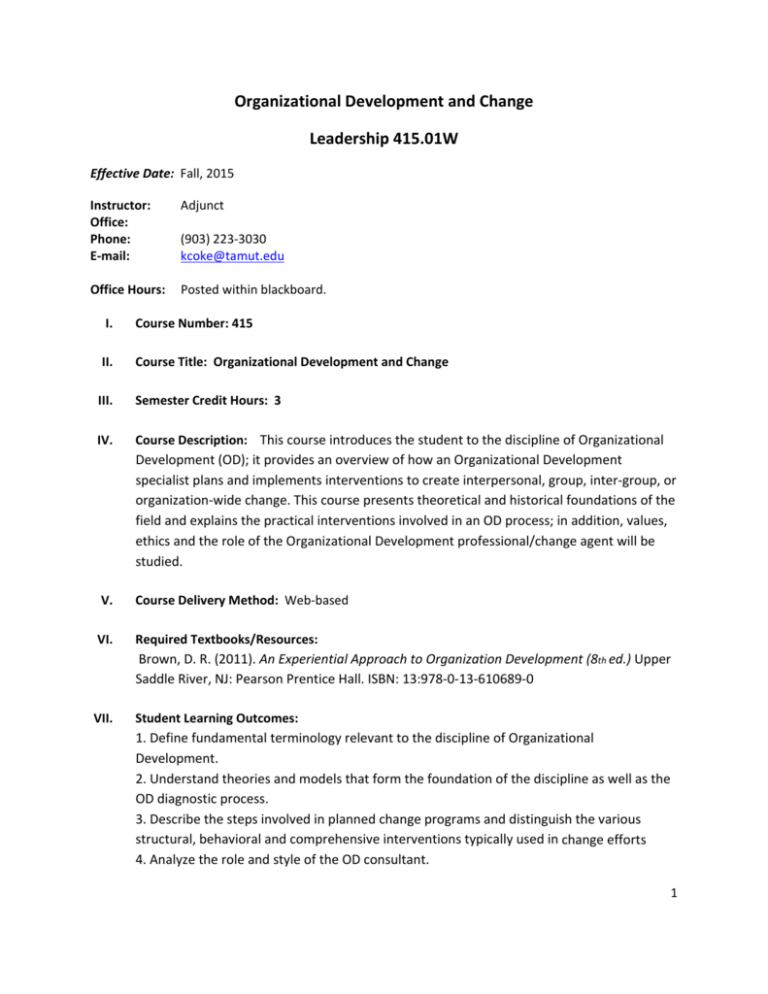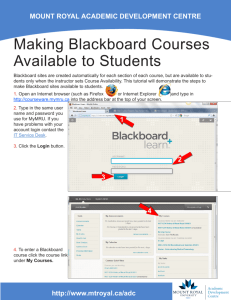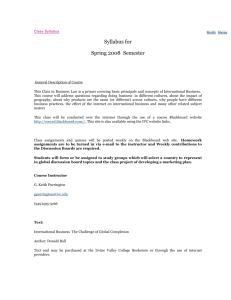
Organizational Development and Change Leadership 415.01W Effective Date: Fall, 2015 Instructor: Adjunct Office: Phone: (903) 223‐3030 E‐mail: kcoke@tamut.edu Office Hours: Posted within blackboard. I.
Course Number: 415 II.
Course Title: Organizational Development and Change III.
Semester Credit Hours: 3 IV.
Course Description: This course introduces the student to the discipline of Organizational Development (OD); it provides an overview of how an Organizational Development specialist plans and implements interventions to create interpersonal, group, inter‐group, or organization‐wide change. This course presents theoretical and historical foundations of the field and explains the practical interventions involved in an OD process; in addition, values, ethics and the role of the Organizational Development professional/change agent will be studied. V.
Course Delivery Method: Web‐based VI.
Required Textbooks/Resources: Brown, D. R. (2011). An Experiential Approach to Organization Development (8th ed.) Upper Saddle River, NJ: Pearson Prentice Hall. ISBN: 13:978‐0‐13‐610689‐0 VII.
Student Learning Outcomes: 1. Define fundamental terminology relevant to the discipline of Organizational Development. 2. Understand theories and models that form the foundation of the discipline as well as the OD diagnostic process. 3. Describe the steps involved in planned change programs and distinguish the various structural, behavioral and comprehensive interventions typically used in change efforts 4. Analyze the role and style of the OD consultant. 1 VIII.
5. Select various diagnostic tools and the appropriate methodology for collecting organizational data to plan a major change effort. Course Outline: Truncated Term Week 1 – Modules 1 and 2; Case‐Study; Class Discussion; Pop Quiz Week 2 ‐ Module 3 and 4; Case‐Study; Class Discussion Week 3 – Exam I Week 4 ‐ Modules 5 and 6; Case‐Study; Class Discussion Week 5 ‐ Module 7 and 8; Case‐Study; Class Discussion Week 6 – Exam II Week 7 – Modules 9 and 10; Case‐Study; Class Discussion Week 8 – Exam III Methods of Evaluation Course Evaluation: Points Course Pop Quiz 10 points Discussion Board Questions (9 @ 10 points each) 90 points Case Study (10 @ 20 points each) 200 points Exams (3 exams @ 200 points each) 600 points OD Practioner Paper or Video Presentation 100 points Total Points: 1000 Extra Credit: A: 1000‐900 B: 859‐800 C: 759‐700 D: 699‐600 F: 599 or below IX.
Grading Scale: A = 90‐100% B = 80‐89% C = 70‐79% D = 60‐69% F = 0‐59% A: 1000‐900 B: 859‐800 C: 759‐700 D: 699‐600 F: 599 or below XI. Library/Media Resources Assessment: The student is required to use the University library for additional research for assignments. Student Participation: a. Participation Policy: Online participation is required for this course. The student’s interpretation of the reading material assigned and feedback to other students in small 2 group discussions are an important part of the learning process. Please contact the instructor with any problems regarding online activities. b. Course Etiquette: In this course students are to conduct professional and respectful dialogue. Dialogue should also include correct grammar and spelling of content. Passionate discussion is encouraged as done so respectfully. E‐mail the instructor as if you were turning in an assignment. Do not e‐mail the instructor as if you were sending a text message to your friends or in all CAPS. Please review http://www.albion.com/netiquette/corerules.html from the book Netiquette, by Virginia Shea. XII: Assignments and Assessments All assignments and exams will be submitted via Blackboard. E‐mail assignments will not be accepted. Assignment passed the due date will not be accepted; unless, the instructor is contacted 48 hours prior to the assignment due date. Only university excused absences will be accepted for tardiness of assignments. Grading rubrics will be provided in Blackboard for evaluation of all assignments. The instructor reserves the right to change the assignment due date as needed. All due dates are posted in Blackboard under the “Save the Due Dates” tab. Students are encouraged to contact the instructor with any questions regarding the course lectures or assignments. Discussion Board Questions (90pts.): There are nine discussion questions valued at 10 points each. The student will participate in an asynchronous (not at the same time) format using the discussion board tool in Blackboard. Since meeting time is online, discussion board questions and responses will be submitted via Blackboard only. Postings and responses are by the due date. No credit will be given for past due responses. Postings will receive full credit for coherent, proper grammar, and good philosophical content. Case Study (200 points): Each student will submit a Case Study from selected chapters in the text, An Experiential Approach to Organization Development. A case study will also entail research from the A&M‐Texarkana’s online library. The case study is designed to help students understand the concepts of organizational development and provide real world experiences. Prolific questions are provided in the textbook to help the student analyze the case study using ideas and practices presented in each chapter. Each case study will be submitted in Blackboard. There will be a total of ten case studies valued at 20 points each. 200 points OD Practitioner Paper or Video Presentation (100 points): 3 Students will select an organizational development practitioner to interview. The purpose of this assignment is to help the student better understand the role of an organizational development practitioner. The text describes an OD practitioner “are people who use, advocate, and assist others to implement OD” (Brown, 10). Students should give the OD practitioner adequate time in scheduling an interview and should always conduct their behavior professionally and ethically. Students will determine the interview questions and will submit by week#3 for instructor approval. The questions will be grounded around the tenets of the following: Why their interest and career choice in OD; building learning organization; implementing total quality management programs; creating boundary less organizations; implementing organizational development programs; and ethical values. Student will submit the final assignment in one of the following formats in BLACKBOARD ONLY! Do not e‐mail the assignment to the instructor: Paper Submit a paper with the following requirements: 5 pages minimum; APA format; Arial or Times Roman; proper spelling and grammar. Video Students have the option of submitting a “You tube video” interviewing the OD practitioner. (The student can submit the YouTube video within the Blackboard assignment submission.) The interview should be a minimum of 10 minutes (no longer than 15 minutes) and include the questions with the required parameters above listed. The interview must be in a professional setting, dress, etc. 100 points Assessments: There will be three exams that will be include multiple choice questions; true and false questions; and essay questions that require you to apply the material covered thus far; questions come from chapter readings and lecture notes. Exams are not comprehensive; each will only cover the recent material not covered on the previous exam. (3 exams at 200 points each) 600 points XIII. Disability Accommodations: Students with disabilities may request reasonable accommodations through the A&M‐Texarkana Disability Services Office by calling 903‐223‐3062. XIV. Academic Integrity: Academic honesty is expected of students enrolled in this course. Cheating on examinations, unauthorized collaboration, falsification of research data, plagiarism, and undocumented use of materials from any source constitute academic dishonesty and may be grounds for a grade of ‘F’ in the course and/or disciplinary actions. For additional information, see the university catalog. 4 XV. A&M‐Texarkana Email Address: Upon application to Texas A&M University‐Texarkana an individual will be assigned an A&M‐Texarkana email account. This email account will be used to deliver official university correspondence. Each individual is responsible for information sent and received via the university email account and is expected to check the official A&M‐
Texarkana email account on a frequent and consistent basis. Faculty and students are required to utilize the university email account when communicating about coursework. XVI. Drop Policy: To drop this course after the census date (see semester calendar), a student must complete the Drop/Withdrawal Request Form, located on the University website http://tamut.edu/Registrar/droppingwithdrawing‐from‐classes.html) or obtained in the Registrar’s Office. The student must submit the signed and completed form to the instructor of each course indicated on the form to be dropped for his/her signature. The signature is not an “approval” to drop, but rather confirmation that the student has discussed the drop/withdrawal with the faculty member. The form must be submitted to the Registrar’s office for processing in person, email Registrar@tamut.edu, mail (7101 University Ave., Texarkana, TX 75503) or fax (903‐223‐3140). Drop/withdraw forms missing any of the required information will not be accepted by the Registrar’s Office for processing. It is the student’s responsibility to ensure that the form is completed properly before submission. If a student stops participating in class (attending and submitting assignments) but does not complete and submit the drop/withdrawal form, a final grade based on work completed as outlined in the syllabus will be assigned. Include the following explanation for web‐enhanced and online courses. XVII. Class Participation: Students are responsible for beginning their participation on the FIRST CLASS DAY by logging on and completing assignments according to the COURSE CALENDAR. Failure to submit online assignments between the first day of classes and the University census date (according to the University schedule) will result in an ADMINISTRATIVE DROP from the course. XVIII. Student Technical Assistance:
Solutions to common problems and FAQ’s for your web‐enhanced and web courses are found at this link: http://www.tamut.edu/Training/Student%20Training/index.html
If you cannot find your resolution there, you can send in a support request detailing your specific problem here: http://www.tamut.edu/techde/support.htm
Blackboard Helpdesk contacts (office hours are: Monday ‐ Friday, 8:00a to 5:00p) Julia Allen (main contact) 903‐223‐3154 julia.allen@tamut.edu Nikki Thomson (alternate) 903‐223‐3083 nikki.thomson@tamut.edu Jayson Ferguson (alternate) 903‐223‐3105 jayson.ferguson@tamut.edu XVIII. Technical Requirements: Minimum Windows PC Requirements:
Pentium IV 1.5GHz+ (preferred: Core Duo) 5
1 GB RAM minimum (preferred: 2 GB)
128MB Video Card minimum ‐ Sound Card is required for some courses
56K modem minimum (Cable or DSL required for some courses)
Windows 2000, XP, Vista or 7
Web browser (Internet Explorer 7.0+; Firefox 3.0+)
Microsoft Word, minimum Office 97 Some courses will need plug‐ins such as Flash player 10 +, QuickTime player 7.0+, Adobe Reader 9.0+, Java Runtime Environment (Java 1.6.0_15), Windows Media Player 10+, RealPlayer, and Macromedia/Adobe Shockwave. Some online courses may also require a CD ROM (8x minimum, higher recommended) Blackboard has certified the following browsers for computers running Windows Operating Systems:
Internet Explorer 8 or 9 (IE is not supported on Windows XP)
Mozilla Firefox 3.6+
Google Chrome Minimum Apple Macintosh Requirements:
Intel Core 2.0GHz+
1 GB RAM (preferred: 2 GB)
128MB Video Card minimum ‐ Sound Card is required for some courses
56K modem minimum (Cable or DSL required for some courses)
Web browser (Firefox 3.0+ ; Safari 3.0+)
Microsoft Word, minimum Office 97 Some courses will need plug‐ins such as Flash player 10+, QuickTime player 7.0+, Adobe Reader 9.0+, Java Runtime Environment, RealPlayer, and Macromedia/Adobe Shockwave. Some online courses may also require a CD ROM (8x minimum, higher recommended) Blackboard has certified the following browsers for computers running Macintosh Operating Systems:
Mac OS 10.2 (Jaguar): (Safari 1 is compatible)
Mac OS 10.3 (Panther): Safari 1.2 (Firefox 1.5 is compatible)
Mac OS 10.4 (Tiger): Safari 2 and Firefox 1.5
Mac OS 10.5 (Leopard): (Firefox 2.0 is compatible) 6 I‐OS and Android Devices These devices are currently supported using the Blackboard Mobile App, available for free from your App Store or scan the code below: To access Texas A&M University ‐ Texarkana, there is an individual license fee of $1.99 per year or $5.99 lifetime. This fee gives you access to the university from all your (same platform) devices; it is not necessary to pay the fee for each device you own. 7




